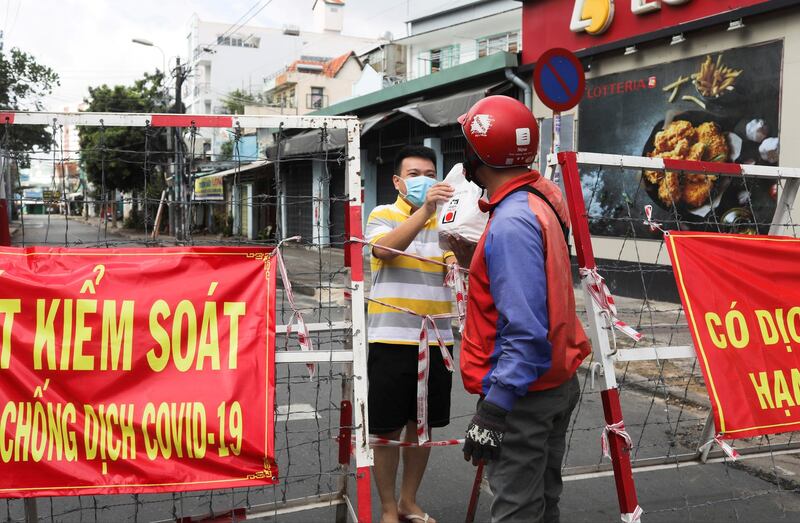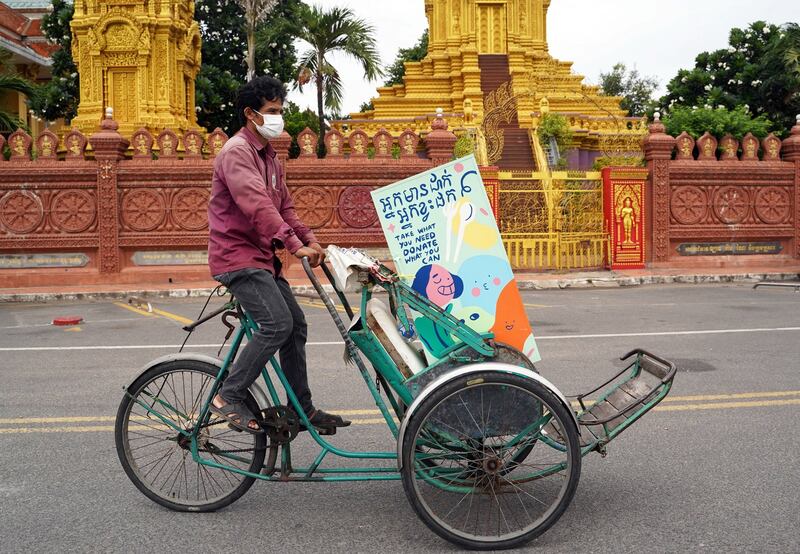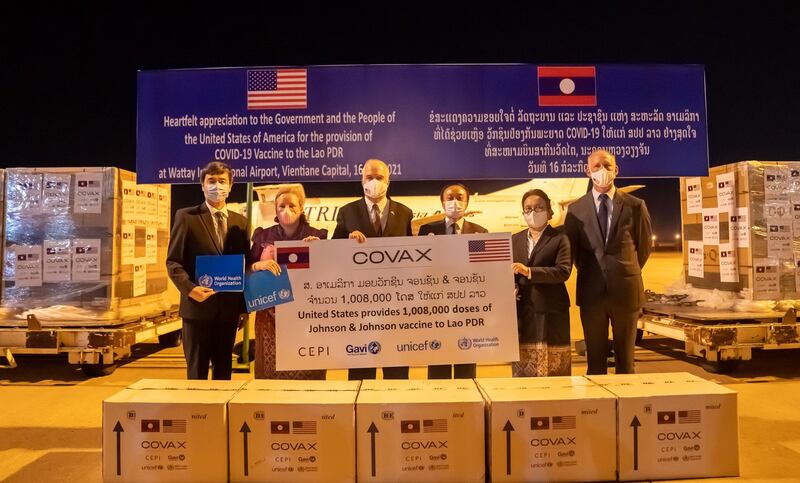Vietnam has rescinded a recent endorsement of 12 traditional medicines as effective treatment against COVID-19 after promotion of the herbal remedies by the country’s health ministry caused an outcry among experts.
Nguyen Truong Son, the deputy health minister, issued a dispatch on bolstering COVID-19 prevention measures with traditional medicines and herbal products on Saturday--only to recall it Monday after it created a backlash among pharmacists and started a storm on social media over the weekend.
Son explained the withdrawal saying that it had some inappropriate content that the ministry spotted only after publishing the dispatch.
According to the VietnamPlus online newspaper, after seeing the dispatch, experts and pharmaceutical industry employees expressed anger that many of the listed supplements and products do not work on COVID-19.
Nguyen The Thinh, the head of the Traditional Medicine Administration, told state media Monday that his organization assessed that the herbal products, donated by companies for the fight against the pandemic in the northern Bac Giang and Bac Ninh provinces, were safe.
Son had earlier said that traditional medicine had been used effectively in Bac Giang Province.
Manufacturers raised the prices of some of the supplements on the list on July 19, five days before Son’s dispatch was issued.

Not a curfew
Vietnam’s economic hub and largest city Ho Chi Minh City banned the public from going outside between 6 p.m. and 6 a.m. each day, but maintained that the order was technically not a curfew.
“This isn’t a curfew. People shouldn’t misunderstand this regulation,” Nguyen Thanh Phong, chairman of the city’s people’s committee, told a committee meeting Sunday.
After publishing a report Sunday with the headline, "Ho Chi Minh City Imposes a Curfew from Tomorrow Night," the VnExpress online newspaper updated it to "Ho Chi Minh City Requires Residents to Not Go Out After 6 p.m."
Vietnam had been among the most effective countries in tackling COVID-19, reporting no deaths among its 99 million people through late July 2020—an outcome attributed to effective contact tracing, strict quarantines, and early testing.
Since then, four separate waves of the virus swept over the country. On Monday Vietnam reported 7,882 new confirmed cases, bringing the total to more than 100,000, according to statistics from the Ministry of Health.
Of the country’s 106,347 confirmed cases, 102,576 tested positive during the current outbreak, which started on April 27, 2021.
On Monday the ministry recorded 154 COVID-19 related deaths between July 8th and 25th, 129 of which occurred in Ho Chi Minh City, the current epicenter. A total of 489 of the country's 524 COVID-19-related deaths have occurred during the current outbreak.
Though the ministry did not disclose the ages of the deceased patients, it said most were elderly with long-lasting underlying conditions, including cancer, diabetes, blood diseases, high-blood pressure and hepatitis.
Three month extension for poor Cambodians
The Cambodian government announced a three-month aid extension for the nation’s poor starting at the end of July, following a report from the Ministry of Social Affairs, Veterans and Youth Rehabilitation saying the government so far has spent nearly US $400 million for more than 650,000 poor and vulnerable families.
Civil society groups, however, said that the coronavirus relief cash has not been sufficient and has not reached many people who deserve the aid.
Lach Sok Khay, a former massage therapist, who lives in a rented room in the capital Phnom Penh, told RFA’s Khmer Service she receives more than 140,000 riels (US$35) per month from the state, but this money does not cover her basic expenses because she has many family members, and each has lost their jobs.
She intends to ask the government to increase her subsidy or increase her food aid until she can find work again.
“Yes, I want Samdech Hun Sen to help with money or food, so we have enough to live on. When we get relief from COVID-19 we can find ways to help ourselves,” she said, using an honorific for the prime minister.

Others who live in rental units have never received any funds from the state.
Heng Sopheaktra, a cyclo driver in Phnom Penh, told RFA he received donations of rice, fish, fish sauce and dry noodles in late April, the only time he got aid from the state.
“The poor people I know have never received state-funded aid. I know this because I meet them every day,” he said.
RFA on Monday attempted to contact the Ministry of Social Affairs, Veterans and Youth Rehabilitation Spokesman Toch Channy for comment but he could not be reached.
Watchdog organizations have urged the government to continue to support the poor and find more means to help them.
Yean Reaksa, a board member of the Women's Association for Society, told RFA that the COVID-19 crisis is still severe in Cambodia, and it has caused people to completely lose their income, while electricity, clean water and other essential needs remain very expensive.
“We are still concerned that the aid distributed to the poor is not enough. The people’s need is real,” said Yean Reaksa.
“I hope the state understands this and can take all necessary action for the people in dire need,” she said.
The Ministry of Social Affairs started providing subsidies to citizens registered as impoverished and carrying a poverty equity card in June 2020. On average, poor families in rural areas receive a subsidy of 200,000 riels ($50), while in Phnom Penh, they can get an average of $80.
Cambodia’s Ministry of Health, which has a goal of vaccinating 10 million people out of the country’s total population of 16.5 million, announced that it had vaccinated nearly seven million so far.
As of Monday, the ministry recorded 22 new COVID-19 related deaths, bringing the total to more than 1,300. It confirmed nearly 800 new cases, more than half of which contracted the disease outside of the country.
More Lao migrants return home
Laos’ Labor and Social Welfare Department estimated Monday that 200,000 Lao migrant workers have returned home from Thailand, including 70,000 in the last month and a half.
“Our province receives an average of 300 Lao workers from Thailand a day and their rate of infection is high, up to 30 percent,” Santiphab Phomvihane, Governor of the southern province of Savannakhet told local media on Sunday.
“Right now, we’re opening three more quarantine centers. The largest one in Nonsa-ath village in Kaisonephomvihanh district can house up to 10,000 people,” he said.
Dr. Phonpaseuth Xayamoungkhoun, deputy director general of the Communicable Disease Control Department, told a news conference Monday that all the newly confirmed cases on Monday were migrants who had returned to Laos from Thailand.
“Today, we tested 1,344 samples and found that 223 of them were positive for COVID-19,” he said.
Of the new cases, 119 appeared in Savannakhet, with 37, 31, and 19 in the nearby provinces of Champassak, Saravan, and Khammouane.
The capital Vientiane had 16 new cases, while Borikhamxay to the capital’s east had one new case, Phonpaseuth Xayamoungkhoun said.
Laos’ Deputy Prime Minister Kikeo Khaykhamphithoune, chairman of the Lao National Taskforce for Covid-19 Prevention and Control, told a news conference on Sunday that 1,324 Lao workers returned home the previous day, with a total of 9,083 returned migrants housed in 49 quarantine centers in the country.

A Vientiane health official told RFA’s Lao Service that the government began registering people on Monday for the coronavirus vaccine manufactured by Johnson & Johnson.
“I know that many people are waiting for these vaccines. The vaccination will be conducted at the provincial and district hospitals nationwide,” the official said.
Last week, Peter Haymond, the U.S. ambassador to Laos, said that Washington had provided 1,008,000 doses of the Johnson & Johnson vaccine to Laos through the COVAX initiative.
As of Monday, Laos has confirmed a total of 4,985 cases and five deaths. The country has partially vaccinated 1,062,000, and fully vaccinated 828,000, of its 7 million people.
Reported by RFA’s Vietnamese, Khmer and Lao Services. Translated by Anna Vu, Sok Ry Sum and Max Avary. Written in English by Eugene Whong.
